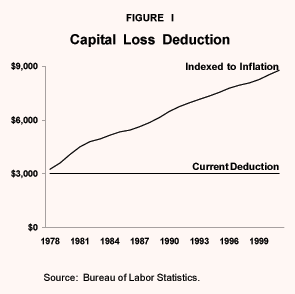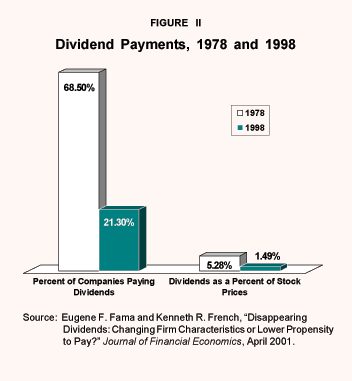With continued sluggishness in the economy, the Bush administration is looking at new tax initiatives that will have a quick, positive impact on growth. However, the key to truly helping the economy is long-term, not short-term, thinking. President Bush should move to revive the tax proposals announced after his Waco economic summit in August 2002. These include:
- Allowing investors to "expense" capital losses – now limited to $3,000 per year above realized gains – so that realized losses are fully deductible from taxable income.
- Increasing the amount of money workers can contribute to their 401(k) plans – limited to $11,000 under current law.
- Relieving the double taxation of corporate profits.
In addition, members of President Bush's staff have indicated that cutting the capital gains tax rate, reducing the extra taxes paid by mutual fund investors and other options are under discussion.
By stimulating saving, investment and risk-taking, these tax initiatives would boost the stock market and individual wealth. In addition, they would improve corporate governance, thereby reinforcing recently enacted accounting changes and helping to prevent future Enrons.
Investor Assistance
Expensing capital losses would help distressed investors who have suffered a beating in the market. At present, Uncle Sam is like a partner who gets 20 percent of all profits but shares only $3,000 of any losses. This is obviously unfair, especially since the loss limit has not been increased since 1978. Just indexing the loss limit to inflation would have raised it to almost $10,000 by now. [See Figure I.] Bills introduced in the 107th Congress would have increased the limit up to $20,000. However, little action has been taken on these proposals.
It is unlikely that the administration will be able to fully offset losses, since accumulated losses are so large due to the stock market crash. Also, lawyers will argue endlessly that full deductibility of losses will become a tax shelter. However, economic theory is quite clear that such deductibility strongly encourages risk-taking. Even with higher capital gains rates than we have today, investors would be much more willing to incur risks if they knew that Uncle Sam would fully share in them.
Increasing 401(k) contribution limits also will aid investors who have suffered in the market. Since losses in 401(k)s are not deductible, increasing loss limits does not help. Therefore, workers need an opportunity – if only temporarily – to catch up and raise their retirement savings to the levels they had reached before the stock market crash.
Corporate Profits
President Bush's third proposal would relieve the over-taxation of corporate profits. With such profits taxed 35 percent at the corporate level and as much as 38 percent when distributed to the company's shareholders, the effective rate on corporate profits is as much as 60 percent. By contrast, the profits of partnerships or Subchapter S corporations are taxed at personal income tax rates.
Economists have long condemned this system. It raises the cost of capital and depresses investment, encourages excessive corporate borrowing and discourages dividend payments. Furthermore, two businesses of equal profitability can pay sharply different tax rates on their earnings based solely on their legal form of organization.
In the past, dividend payments were the best assurance investors had that corporate profits were "real." More recently, unfavorable tax treatment has led corporations to forgo paying dividends at all:
- The percentage of large companies paying dividends in a given year fell from 68.5 percent in 1978 to 21.3 percent in 1998.
- The average dividend yield on stocks – that is, dividends as a percentage of shares' market prices fell from 5.28 percent to 1.49 percent over the period, according to economists Eugene Fama and Kenneth French. [See Figure II.]
With the disappearance of dividends, an important element of investor control over management was lost. It is much easier to manipulate earnings statements in order to boost the stock market value of shares than to come up with cold cash to pay dividends. Therefore, allowing investors to receive their dividends tax free not only would eliminate double taxation and lower the cost of capital but also would help to restore investor trust in corporate management.
Capital Gains
Cutting the capital gains tax rate obviously fits into this agenda. No other single action the federal government could take is more certain to have a positive impact on stock prices. This fact is borne out by long experience. When the capital gains tax was raised in 1969, the increase led to a flat to falling stock market for almost 10 years. When the rate was cut in 1978 and 1981, the decrease set off one of the greatest booms in history.
According to the Treasury Department, an almost exact inverse relationship exists between the long-term capital gains tax rate and realizations as a share of gross domestic product. When the rate goes up, realizations go down; when the rate goes down, realizations go up. Generally speaking, the magnitudes are such that the government makes money when the rate is cut and loses money when it is increased.
Mutual Fund Investments
Finally, for years there have been concerns that mutual fund investors are disadvantaged relative to direct stock purchasers because fund managers control the realization of gains for tax purposes. Every April 15, many mutual fund investors find that they must pay taxes on distributions although they did not sell any shares. Fixing this problem by allowing capital gains taxes to be deferred until mutual fund shares are sold not only is fair but also will encourage investment in corporate stock.
Conclusion
An investor-oriented tax relief package may be perceived as a giveaway to the rich. However, economist David Malpass of Bear Stearns says that the markets will view positively President Bush's willingness to take on those who argue against pro-growth tax cuts using class warfare rhetoric. Even if these proposals do not make it into law in the new Congress, investors will view favorably his willingness to stand up for them.
Bruce Bartlett is a senior fellow with the National Center for Policy Analysis.